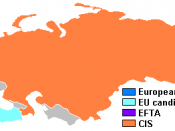Social status, civilization and the idea of a 'normative power Europe'
Edward Keene
Sam Nunn School of International Affairs
Georgia Institute of Technology
To say that the European Union (EU) is a 'normative power' is to say that it wields 'power of an ideational nature characterized by common principles and a willingness to disregard Westphalian conventions' (Manners 2002, 239). The EU stands for several clearly stated core principles - commitments to peace, liberty, democracy, the rule of law, human rights, social solidarity, anti-discrimination, sustainable development and good governance - which are different from the principles according to which the 'Westphalian system' has traditionally been organised, and which it aims to diffuse through a variety of means across international society as a whole. One of the main roles of the EU, and perhaps even its principal role, is thus to change the norms of the society of states. It does so not just by saying and doing things, but in part simply by being different, by embodying different values that others wish to emulate.
My purpose in this paper is not to contest this interpretation of the EU as it exists today, but to offer some sociological and historical reflections on the idea that it is a 'normative power'. There are two themes to the discussion. First, I want to raise the question of what normative power is and where it comes from: what are the attributes of a state or international organisation that has normative power; and why do some appear to have more of it than others? The latter question is especially important because it is not enough just to say that normative power derives from values: everyone has values; the critical issue is why some people are able to make their values the definition of what is 'normal'.


